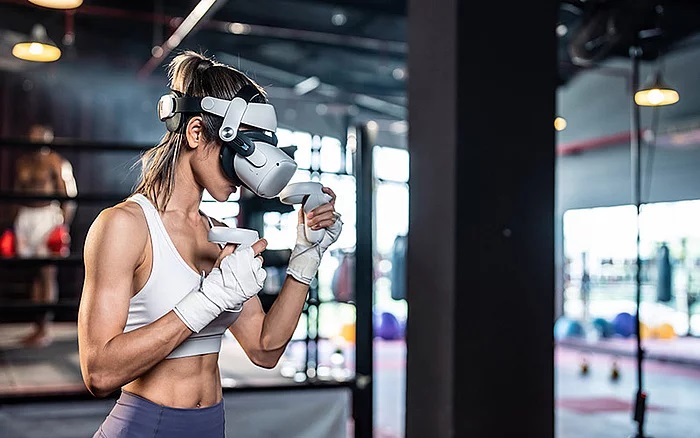The entire entertainment sector is transforming at a constitutional level and an unprecedented rate. Recognizing this shift and anticipating its trajectory, the IP Trend Monitor expert panel were asked for their opinions on some of the innovations affecting the production and consumption of media.
The results provide a fascinating insight into the evolution of digital entertainment over recent years and allow us to make informed legal inferences about how the Intellectual Property (IP) system will need to adapt or, in certain cases, be adapted to.
Connect with our technology and media experts!
Artificial intelligence
When ranking the most influential technologies in digital media, nearly three quarters of respondents identified artificial intelligence (AI) as their first or second choice. The nature of this impact was expanded on by a number of panelists, centering on the protection of authors and performers against AI use and the limits of copyright eligibility for generated works. It was clear from the survey that enthusiasm for AI implementation is tempered by a recognition of its threat to livelihoods and the acquirement of IP rights.
Metaverse and digital commodities
The tumultuous record of metaverse concepts and digital commodities over recent years has ensured sustained attention, for better or for worse. Survey respondents acknowledged the effect the expansion of digital work and social environments will have on the type of content created and how it is proliferated. As such, 20% agreed that securing copyrights for interactive media is the most critical aspect of IP protection for the entertainment industry's success. Yet despite this strong showing, panelists did not foresee the shakeup brought on by metaverses and non-fungible tokens (NFTs) to be nearly as profound as that posed by AI tools.
Virtual reality and augmented reality
The emergence of large-scale metaverse projects has galvanized the development of virtual reality (VR) and augmented reality (AR) systems and hardware. Hence, a tepid reception and flagging interest have been reversed by the promise of new applications for interactive technologies, and this turnaround was reflected in survey answers. VR and AR were ranked comparably to the digital goods and services that offer these human-computer interfaces fresh purpose.

The idea of a VR headset has existed since at least 1935 with Stanley Weinbaum's story short "Pygmalion's Spectacles." However, the intervening time has seen numerous false starts for marketable products.
Video on demand
Though the video-on-demand (VOD) model is extremely successful, it would appear that the majority of the changes it can make to the entertainment sector have already been realized. An overwhelming 79% of respondents ranked VOD models as three or four on a four-point scale of future impact. That being said, when questioned on the industry's need for innovative licensing models, only 10% believed traditional approaches were adequate. These results suggest that the industry upheaval initiated by VOD services has yet to find an equilibrium.
Industry examples and market trends
The fact that the entertainment industry is prodigiously wide means that new technologies and service models will affect different forms of digital media unequally. In the results of the IP Trend Monitor survey, several prominent movements can be seen that, at some point, may intersect or even clash.
Reining in AI
At the December 2023 summit of the Global Partnership on Artificial Intelligence (GPAI) in New Delhi, the dual reality of deepfakes was discussed by advocate to the Supreme Court of India, N.S. Nappinai. Though deepfakes are typically viewed as an artistic and moral danger, they may also be creative works in and of themselves. Thus, they can be beneficiaries of IP protections just as easily as they can be infringers, with parodic fair uses being examples of permissible applications of the technology. Yet N.S. Nappinai stressed the limits of this exception, adding that where deepfakes are used to create pornographic content is "where you cross the line, and you cannot claim the defense of fair use."
In light of the risks to security and personal dignity, various technical initiatives have emerged to combat malicious deepfakes, including the Semantic Forensics program from the Defense Advanced Research Projects Agency (DARPA) and others from DeepMedia, Google, Intel and Microsoft. Meanwhile, the Digital Services Act (DSA), applying to all online platforms in the European Union since February 2024, aims to curtail illegal, IP-infringing or socially manipulative content on the internet.

The DSA particularly hopes to increase the protection of children and young people from illegal material online and bans targeted advertising to minors. In parallel, content moderation policies will need to be transparent and accountable.
Regarding safeguards for performers, a four-month actors' strike in the United States came to an end in November 2023 with an agreement that included, among other topics, provisions for the use of AI in video entertainment. Under the three-year contract, employers will seek consent to create a "digital replica" of a real human and pay that person the equivalent salary of the expected time on set, with residuals / royalties for added screen time. Also, with an eye to upholding jobs and opportunities, employers must consult the SAG-AFTRA union before using "synthetic performers" completely generated by AI tools.
With regard to AI-generated creative works such as text, songs, images and video, highly debated legal issues stem mainly from the crucial question of ownership – Who made this? Content being created according to a prompt provided by an operator selecting and using generative models that are in turn built and trained by their developer on a corpus of pre-existing (often copyrighted) works by others, a three-party dynamic arises: prompter / selector, creator / trainer of the model and owners of the training material. This leaves the door open to several legal approaches that go beyond the classical but very stretched analogy ofan artist who uses technical tools and receives inspiration from the works he has experienced.
Looking back to stream ahead
Demand for video streaming exploded during the COVID-19 pandemic, with worldwide revenue growing from $83.34 billion USD in 2019 to $154 billion USD just two years later. In 2022, market penetration in the United States hit 80%, and by April 2023, the number of worldwide users reached approximately 3.5 billion. However, the rapid inflation that came in the wake of the COVID-19 pandemic curtailed the VOD growth witnessed during lockdowns.
In response, the industry appears to be taking a leaf out of its own history book, turning to advertiser funding to prop up user subscriptions as household incomes continue to be strained. When polling consumer preferences for VOD models, Deloitte Global uncovered some revealing statistics: 59% of Americans, 62% of Germans and 70% of Japanese consumers favored ad-supported video streaming options as a way to reduce or eliminate subscription fees. A notable example of this was the move by Disney+ to introduce payment tiers in Europe and North America in the second half of 2023. Amazon Prime Video quickly followed suit, rolling out limited advertisements in early 2024.
Exploring invisible worlds
As things stand, VR and AR systems are the envisioned, or at least preferred, means of accessing and interacting with metaverse platforms. Hence, the success or failure of either technology would seem to depend on the other's performance. This intertwined fate explains Meta's spending of $36 billion USD on its VR and metaverse division, Reality Labs, just in the period 2019-2022. Yet the social media giant seems undeterred by comparatively meager returns on investment, as suggested by a product roadmap obtained by The Verge. Releases of new Quest-series VR headsets, AR glasses and a "neural interface" smartwatch are planned until 2027.

The ways we produce and consume media have seen an upheaval in recent years, accelerated by the global pandemic. As the industry begins to settle, traditional advertising models are returning to the fore as "tried-and-true" monetization strategies.
Not content to wait for virtual marketplaces to become widespread, the global trademark system has adapted to accommodate the exchange of digital commodities. By and large, the IP system is equipped to handle virtual goods and other digital assets satisfactorily, with the Nice Classification system providing for NFTs and their related media and software. In the interim, however, the hype surrounding NFTs has collapsed, with a recent study by dappGambl indicating that 95% of NFT collections had a market capital of zero. This would imply that the disruptive effect of these assets on the entertainment industry and the IP system itself will be minimal for now.
What is next for the industry?
Digital media is at a pivotal juncture – where advanced technologies meet artistic crafts and legal frameworks designed to support human creativity. All roads see AI as a dominant force, as do the majority of IP Trend Monitor respondents, meaning the concerns regarding its effect on the creation and monetization of content, as well as the consequences for rights holders, will need to be addressed.
In the most ambitious move yet witnessed in this direction, the EU has recently passed its landmark AI Act. Lauded as the world's first comprehensive legislation on AI, the law passed by the Council of the EU on May 21 this year creates a dedicated AI Office to oversee the rules' implementation and investigate transgressions. Additionally, an independent expert panel, a member state board and an advisory forum will all be established to help ensure effectual and consistent enforcement.
Crucially for IP owners in the EU, generative AIs will be required to comply fully with existing copyright law and publicize the databases used in training their models. A similar law, the Generative AI Copyright Disclosure Act, is currently under consideration in the United States.
Meanwhile, content owners such as The New York Times and, more recently, a selection of the world's biggest record labels are suing AI companies for copyright infringement, specifically for the alleged non-authorized training on their copyrighted material. This context is further exacerbated by the fact that at least one AI bot has been discovered scraping web content for its responses while hiding its identity to circumvent the Robots Exclusion Protocol. Often referred to as robots.txt, the largely honor-based and not (yet?) legally binding system prohibits bot access at the rightsholders' choice.
With the proliferation of AI and increasingly online lifestyles, fresh avenues for IP-infringing behavior will require new laws such as these and ever-greater vigilance from trademark and copyright holders. Finally, the boundaries defining what creative works are and are not eligible for IP protection will be earnestly debated, with high stakes for compensation and brand identity.
The content of this article is intended to provide a general guide to the subject matter. Specialist advice should be sought about your specific circumstances.


